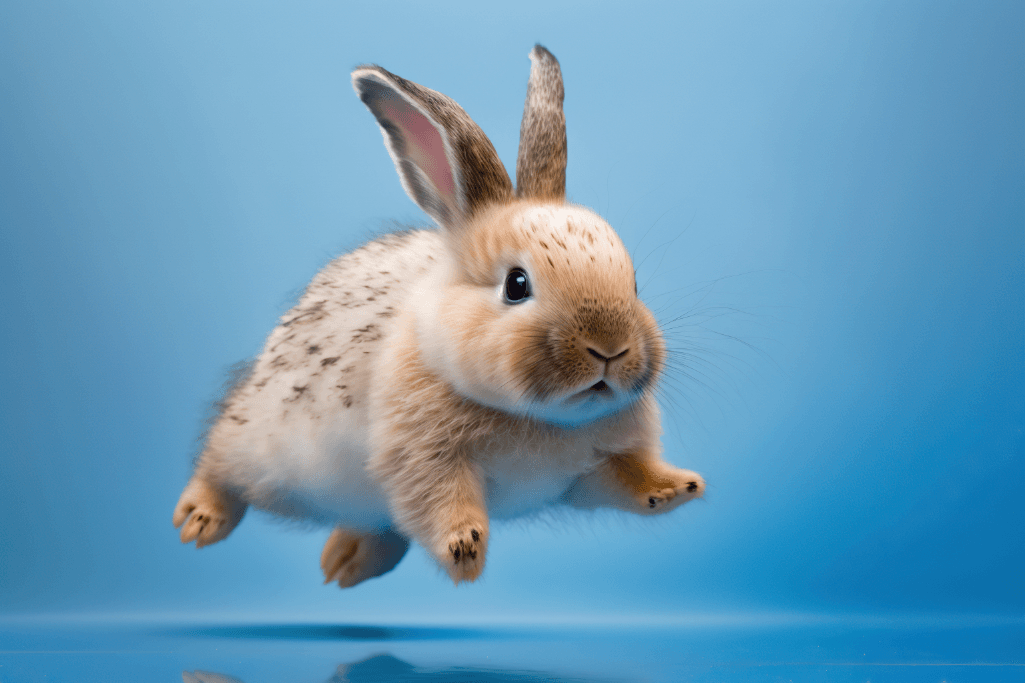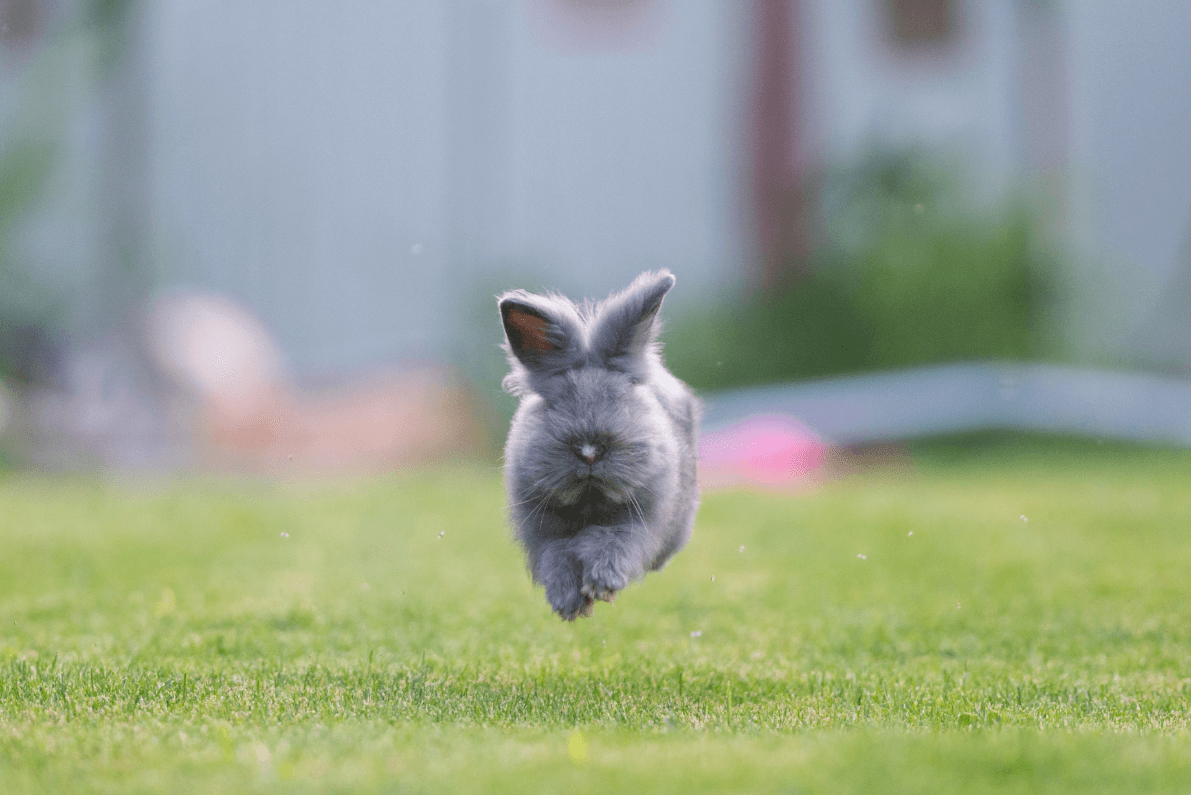
A Guide to What to Feed Your Rabbit
Feeding Your Rabbit the Right Diet

Rabbits love food and tend to graze throughout the day to sustain their appetite; getting the right balance for your pet’s diet is important so they can maintain a healthy lifestyle. Feeding your pet the right diet is essential to keeping your rabbit healthy.



How much does a rabbit eat?
The bulk of a rabbit’s natural diet should consist of good quality hay or grass (but not fresh lawn clippings as they can ferment quickly) measured to the equivalent of their body size. Fresh hay is an essential part of a rabbit’s diet, and you need to provide a constant supply of enough hay for your rabbit to graze on. Chewing hay is good for a rabbit’s teeth, which keep growing throughout their life and need to be worn down naturally.
Typically we recommend a bundle of fresh hay at least the size of the rabbit. This type of food helps to maintain your rabbit’s general health, with hay providing support to wear your pet’s teeth down as they continuously grow, and to give them the right amount of fibre required for their digestive health.
There are a number of different varieties of hay available, and the right choice will depend on your rabbit’s age, health and size. For example, alfalfa hay can be a good choice for younger rabbits, but shouldn’t be fed to adult rabbits due to its high calcium and carbohydrate content.

The rest of their diet can be made up of fresh leafy greens which should be provided every morning and evening. Rabbits eat a variety of vegetables and greens, and we recommend around one handful (adult-sized) per day. Rabbits enjoy spending time foraging, so they enjoy a mix of this kind of food daily which can help prevent boredom, keep them engaged and make their habitat more interesting.
Hay is extremely versatile and perfect for entertaining your rabbit as you can also hide treats and other leafy greens within it for them to rustle out. In addition to their main daily food supply, rabbits are also allowed a treat no larger than one to two tablespoons of rabbit pellets or nuggets a day. It’s also extremely important to give your rabbit fresh water to keep them hydrated at all times.
It’s important to feed domestic rabbits the right amount of food for their body weight.



The best foods for a rabbit
Once your rabbit has been provided with the bulk of their diet (hay), choose from a range of fresh greens from the list of vegetables below. It’s important to provide your pet with a wide variety of safe greens to make sure they have a balanced diet.
Your rabbit’s diet should include a variety, not just one or two types, of the following greens:
- Asparagus
- Bok-Choy
- Brussel-Sprouts
- Broccoli-leaves
- Coriander
- Courgette
- Cucumber
- Lettuce-Romaine-or-dark-leaf
- Mustard-Greens
- Parsnip
- Radish
- Red-Cabbage
- Romaine-Lettuce
- Rocket
- Salad-Peppers
- Turnips
- Celery
- Collard-Greens
- Cauliflower-leaves-and-stalks
- Chicory
- Spinach
- Watercress
- Basil
- Coriander
- Dill
- Mint
- Parsley
- Oregano
- Rosemary
- Sage
- Thyme

Foods you should never feed your rabbit
One of the most common misconceptions about a rabbit’s diet is that they should be fed muesli-style foods. Unfortunately, muesli is high in sugar and starch which are difficult for rabbits to digest and can cause health problems. If your rabbit is fed a high sugar diet this can lead them to gain weight and develop other health problems.
Muesli Muesli should not be fed to rabbits as it can cause teeth and digestive problems.
Dairy products Dairy products are not recommended for rabbits as they are high in sugar and can lead to weight gain and tooth decay.
Potato and potato tops Potatoes generally don’t provide many health benefits for rabbits as they’re nutritionally dense.
Rhubarb (including the leaves) Rhubarb is an irritant and can be poisonous to rabbits.
Tomato leaves Although the flesh is safe to eat, the green stalks of tomato plants contain tomatine and solanine, which is poisonous and can make rabbits very unwell.
If you’re making a change to your rabbit’s diet, it’s best to gradually introduce new foods to see how they react. Your pet may either not like them or they can upset their stomach, which you will be able to tell based on their stool. If you’re ever in doubt as to what foods are safe for your pet, it’s safest to not feed it to them at all.
Foods to feed your rabbit as a treat
Apples (seeds removed) High in sugar, apples should only be fed to rabbits as a treat.
Banana Also high in sugar, it’s safe for rabbits to eat bananas occasionally.
Blackberries Blueberries
Carrot tops Contrary to popular belief, rabbits shouldn’t be fed a lot of carrots as they are high in calcium and sugar, and are best fed as a treat
Dandelion This should only be fed to rabbits in small quantities as it can upset their stomach and cause diarrhoea
Grapes Rabbits have a sweet tooth, so grapes are great as a treat. As with all treats, it’s best to portion these out otherwise your rabbit may overindulge and feel unwell.
Iceberg lettuce Rabbits can’t eat a lot of iceberg lettuce as it contains lactucarium which can be harmful if eaten in large quantities. Darker leaves are more nutritious for rabbits and can be fed more frequently.
Kale Feed sparingly as it has a high calcium content
Melon Papaya Peach Pears Pineapple Plum Raspberries Sweet potatoes Strawberries
Tomatoes Tomatoes are fine to feed your rabbit as a treat, but only the flesh, not the green stalks.

